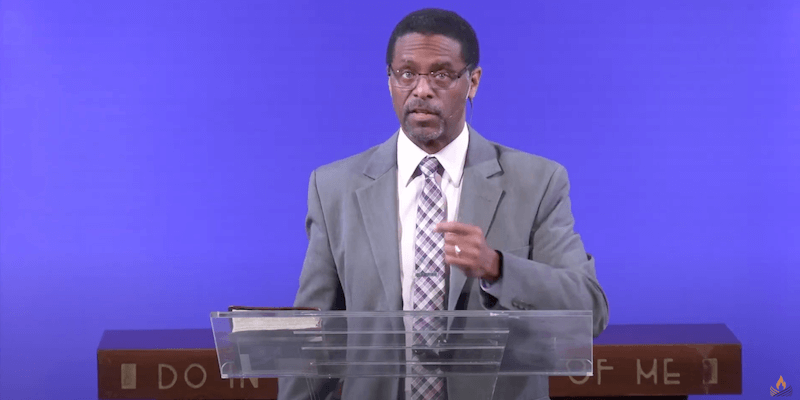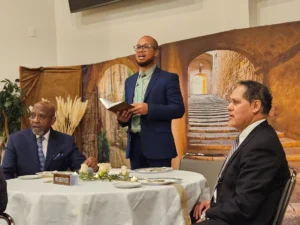We are turning our attention to Acts chapter 5 in our continuing series on the book of Acts. The end of chapter four is key to understanding the early verses of chapter 5. Rewind to Acts 4:32-37.
Who wouldn’t want to belong to a church like this? They were one in heart, one in mind; they shared everything and there was no covetousness. The one thing about which they were one heart and soul was the resurrected Christ who lived in them.
They had “great power” and “much grace”. They weren’t “low-power mode” believers, they were fully filled with Jesus and it showed not only in their preaching but in their caring for one another. They were selfless. What could stop a group like that? Here is an essential ingredient of a great church: “an unlimited commitment to Christ and each other that is expressed in unrestrained loyalty—to the Lord and to one another.” This requires trust and the reason trust is often lacking among Christians is because loyalty and commitment to Christ is lacking or at best, half-hearted. The threat of divided loyalty and half-hearted commitment will soon be seen.
Compare and contrast Acts 4:36-37 with Acts 5:1-6. Luke introduces Barnabas as a generous encourager of the church. Then he introduces Ananias and Sapphira as foils who are the opposite of Barnabas. At first glance, nothing appears amiss in this story. The characters do the same thing. They sell a piece of property and bring the proceeds to the Apostles for distribution. But there is one big difference. Ananias and Sapphira pretend to give the full amount but hold back a portion for themselves. So, what was the problem?
There was no obligation or command to give. Ananias was free to give or not according to his conscience. But he saw how highly esteemed Barnabas was for his generosity and coveted that same esteem. Their sin wasn’t in holding onto a portion for themselves, but in pretending to give it all for the approval of others. That’s hypocrisy and fraud. And when those things come into the fellowship, there is trouble in the church.
Sapphira was given an opportunity to come clean, but she clung to the lie, not knowing what had happened to her husband. She, too, dropped dead and was buried next to her husband. Why was the penalty so swift and severe? God had to protect His infant church. Just like you wouldn’t tolerate a cobra in the nursery with your baby, God wouldn’t allow the venom of hypocrisy to go unchecked in His church. This story serves to show that a church filled with the Spirit is not only to be bold but is to be holy.
Ananias and Sapphira were the first to bring trouble in the church, but it didn’t stop the mission. (See 5:12-16.) Here we see that a church filled with the Spirit is not only bold and holy, it is supernatural.
The early church was extremely effective. Things happened. It wasn’t all talk and no action. It was a church of faith and works. The works of Jesus gave many convincing proofs that He was alive (see 1:3). My friends, the church should also be giving convincing proofs that Jesus is alive. James 2:26 remind us that, “Faith without works is dead.”
What is happening in our churches which could be explained only by the presence of His Spirit at work? And here’s another one to ponder: “What are you attempting which could not be done without the power of the Holy Spirit?” Are our dreams big enough? Bold enough?
What else do these verses tell us about a Spirit-filled church?
- A church filled with the Spirit is not only bold, holy, and supernatural, it is a respected and growing church. (Vs. 13-14) The seeming contradiction is solved when understanding the difference between “the rest” (those who were half-hearted in their loyalty like Ananias and Sapphira), and the authentic “believers” who joined the movement.
- A church filled with the Spirit is not only bold, holy, supernatural, respected and growing, it is a healing church. When the pandemic of sin and viruses is sweeping the globe, let there be a pandemic of the Spirit! Let’s pray for boldness to believe God for healing, both by scientific and supernatural means, proving that Jesus is alive!
But a church like this causes trouble for the devil and sooner or later gets into trouble. Rewind to 5:17-21. Here’s another contrast. In contrast to the healed crowds who respected the church, come the Sadducees who are filled with jealousy and have the apostles (all of them) arrested. “But during the night an angel of the Lord opened the doors of the jail and brought them out. ‘Go, stand in the temple courts,’ he said, ‘and tell the people all about this new life.’” (vs. 19, 20) Don’t miss the humor and irony of an angel being sent to release the apostles who had been imprisoned by the Sadducees who don’t believe in angels!
Upon their second “arrest” the Sanhedrin didn’t even acknowledge their miraculous escape but told them there were given strict orders not to teach in this name. But Peter and the other apostles replied, “We must obey God rather than human beings!” (vs. 29)
Courage, principle, and witness. When these are lacking among Christians, there is trouble in the church.
God raised up an unlikely ally in a Pharisee named Gamaliel (vs. 34-42). His wise counsel saved the day. Finally in verses 41 and 42 we see that a church filled with the Spirit is not only bold, holy, supernatural, respected, growing, healing, and persecuted; it is a rejoicing-despite-trouble church, and that makes it unstoppable!
What kind of church are we? Let’s pray that God makes us unstoppable Christians.
Pastor Randy Maxwell




